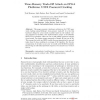Free Online Productivity Tools
i2Speak
i2Symbol
i2OCR
iTex2Img
iWeb2Print
iWeb2Shot
i2Type
iPdf2Split
iPdf2Merge
i2Bopomofo
i2Arabic
i2Style
i2Image
i2PDF
iLatex2Rtf
Sci2ools
ARC
2006
Springer
2006
Springer
Time-Memory Trade-Off Attack on FPGA Platforms: UNIX Password Cracking
Abstract. This paper presents a hardware architecture for UNIX password cracking using Hellman's time-memory trade-off; it is the first hardware design for a key search machine based on the rainbow variant proposed by Oechslin. The implementation target is the Berkeley BEE2 FPGA platform which can run at 400 million password calculations/second. Our design targets passwords of length 48 bits (out of 56). This means that with one BEE2 module the precomputation for one salt takes about 8 days, resulting in a storage of 56 Gigabyte. For the precomputation of all salts in one year we would need 92 BEE2 modules. Recovering an individual password requires a few minutes on a Virtex-4 FPGA.
| Added | 20 Aug 2010 |
| Updated | 20 Aug 2010 |
| Type | Conference |
| Year | 2006 |
| Where | ARC |
| Authors | Nele Mentens, Lejla Batina, Bart Preneel, Ingrid Verbauwhede |
Comments (0)

